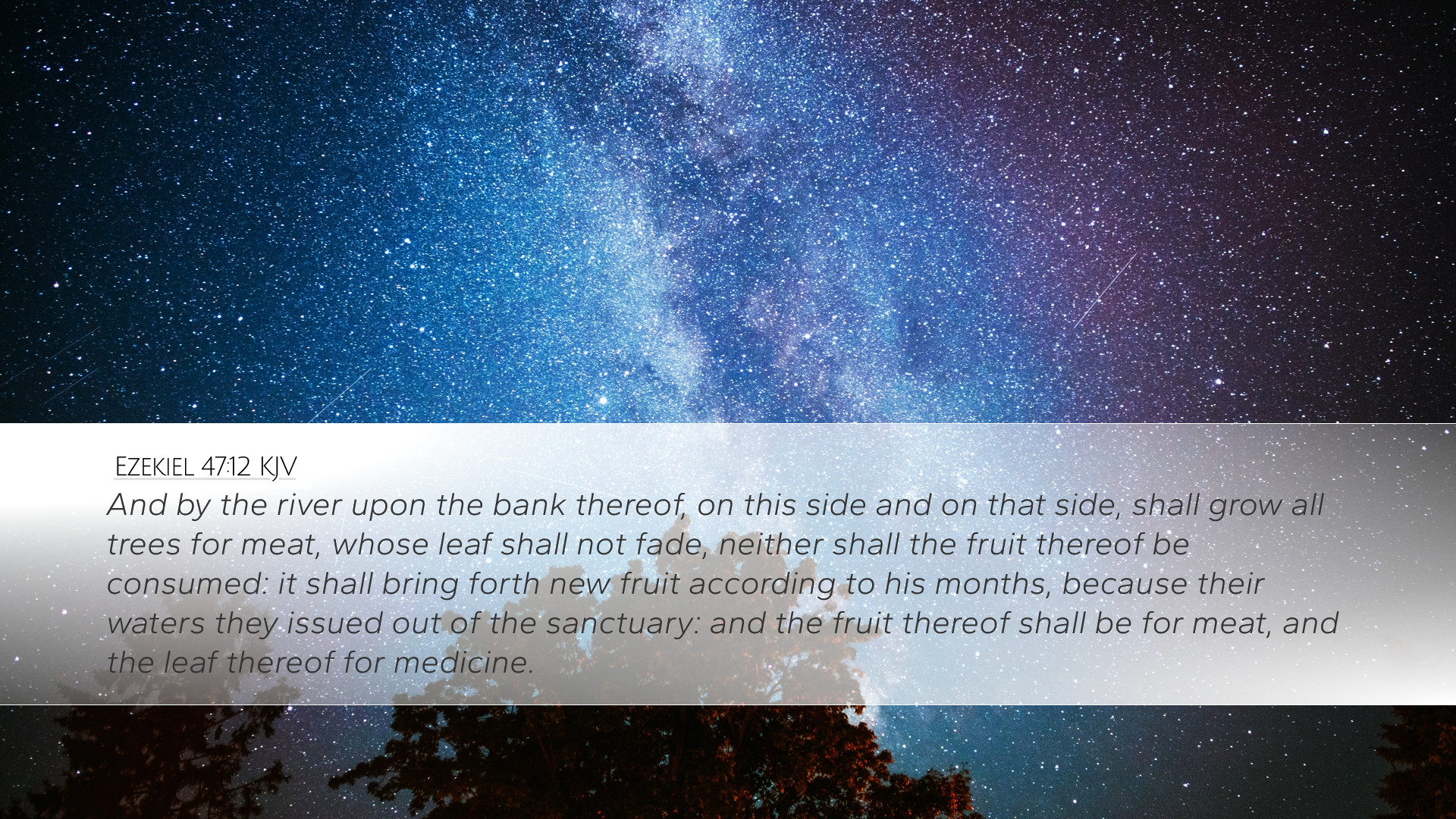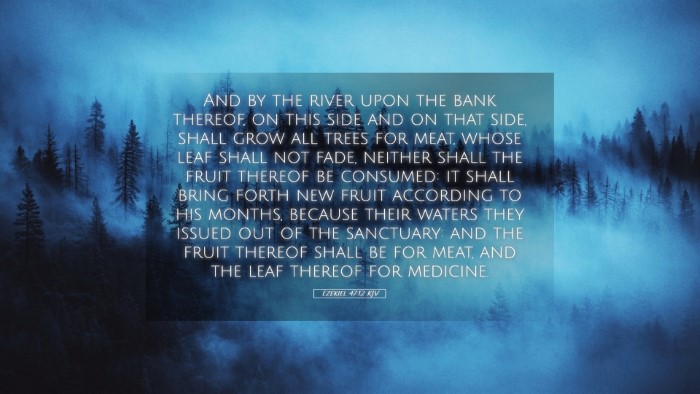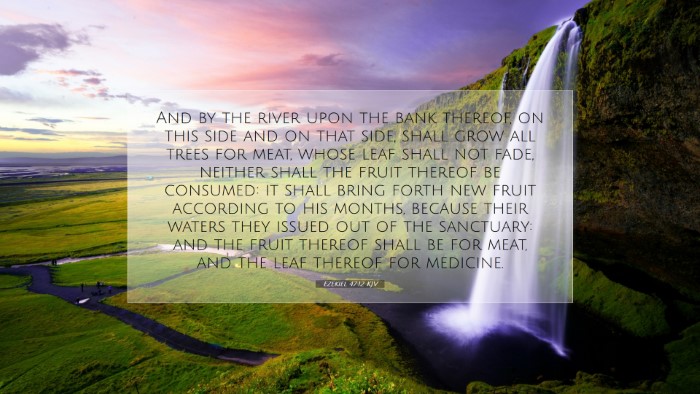Ezekiel 47:12 Commentary
Ezekiel 47:12 (ESV): "And on the banks, on both sides of the river, there will grow all kinds of trees for food. Their leaves will not wither, nor their fruit fail, but they will bear fresh fruit every month, because the water for them flows from the sanctuary. Their fruit will be for food, and their leaves for healing."
Introduction
The vision of the water flowing from the temple in Ezekiel 47 provides a rich symbolic representation of the blessings that flow from God through His presence. This passage encapsulates the restoration promised to the people of Israel and the spiritual nourishment available through the divine source. Public domain commentaries by respected theologians such as Matthew Henry, Albert Barnes, and Adam Clarke shed light on the profound implications of this verse.
Contextual Analysis
The chapter begins with a vision where Ezekiel is taken to the temple and shown a stream of water flowing from its threshold. This illustrates the life-giving presence of God and His provision for His people. The imagery of trees along the banks signifies abundance and nourishment. Each of the commentaries reflects on the significance of the temple, as the dwelling place of God's glory, from which blessings overflow.
Verse Breakdown
The verse can be categorized into key components that encapsulate its meaning:
- Banks of the River: The description of both sides of the river signifies an abundant and prosperous environment. The dual banks symbolize completeness in God’s provision.
- Types of Trees: The mention of all kinds of trees illustrates diversity in God’s gifts and the richness of His creation. In biblical theology, trees often symbolize vitality and life.
- Leaves and Fruit: The leaves that do not wither and the continuous fruit-bearing point to the eternal and sustaining nature of God's blessings. This signifies not just physical sustenance but also spiritual nourishment.
- Source of Water: The water flowing from the sanctuary emphasizes the sanctity and holiness of what nourishes these trees, highlighting that true life comes from God.
- Healing Properties: The leaves are described as being for healing, which points to the restorative nature of God's blessings, not only for individuals but for the community as a whole.
Theological Implications
The theological implications of Ezekiel 47:12 resonate deeply within the Christian faith. The imagery of flowing water has been seen as a representation of the Holy Spirit, bringing life and rejuvenation.
- Life from Christ: According to John 7:37-39, Christ identifies Himself as the source of living water, providing spiritual sustenance that leads to eternal life.
- Community and Healing: The text emphasizes that the leaves of the trees are for healing. This can reflect the church’s role in providing healing through the gospel and through mutual support among believers.
- Perpetual Abundance: The continuous bearing of fruit every month symbolizes the never-ending nature of God’s blessings and provision. It assures believers of God’s faithfulness to sustain them in every season of life.
Insights from Commentators
Matthew Henry
Henry emphasizes the power of the divine source from which the water flows, indicating that it is only through God's presence that true life is possible. He notes the correlation between the spiritual nourishment provided by God and the physical sustenance available to His people. Henry highlights the healing aspect of the leaves, relating it to the renewing work of God in the lives of believers.
Albert Barnes
Barnes elaborates on the symbolism of the trees. He posits that they represent the saints who flourish in the presence of God. He notes that the unchanging nature of the fruit and leaves signifies the stability and permanence of God’s promises. Barnes also provides insight into the implications for both the nation of Israel and the Body of Christ, stressing the importance of remaining connected to the source of life.
Adam Clarke
Clarke’s commentary emphasizes the prophetic nature of this vision, suggesting that it anticipates the blessings of the Messianic age. He makes connections to the New Testament, where revelations of healing and life flourish in the presence of Christ. Clarke also notes that Ezekiel's vision serves as both an encouragement and a warning for God’s people to remain faithful and connected to Him to access these promises.
Practical Applications
Taking lessons from this passage is vital for today’s believers:
- Dependency on God: Recognizing God as the source of life encourages believers to continually seek His presence for spiritual nourishment.
- Community Impact: Just as the trees provide food and healing, believers are called to be agents of healing and support within their communities.
- Seasonal Fruitfulness: The promise of bearing fruit every month serves as an encouragement that believers can experience continual growth and productivity in their spiritual lives.
- Hope in Restoration: This passage serves as a reminder of the restorative power of God, offering hope in times of trial and tribulation.
Conclusion
Ezekiel 47:12 presents a rich tapestry of spiritual truth and theological depth. As believers and scholars reflect upon this verse, it serves as a reminder that their sustenance comes from the Lord. The imagery of the flowing water, the thriving trees, and the healing leaves encapsulates the essence of God's promise of life, healing, and abundance. The insights from early commentators such as Henry, Barnes, and Clarke offer timeless wisdom, applicable not only in ancient Israel but also in the modern-day context of the Church. As we immerse ourselves in this passage, may we be continually revitalized and inspired to bear fruit for the Kingdom.


